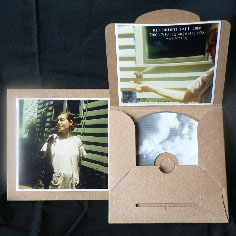
1. 7:00 (mp3 excerpt)
released 2 July 2011
2. 7:59
3. 12:40
4. 6:41
5. 6:28
edition of 100 copies - AVAILABLE

1. 7:00 (mp3 excerpt)
released 2 July 2011
2. 7:59
3. 12:40
4. 6:41
5. 6:28
edition of 100 copies - AVAILABLE
Reviews
Minimalism is an essential element in Noise (gazillions of "static wall noise" pastichers notwithstanding), and this album highlights a very hard-edged kind of minimalism. It sounds to me like the majority of sounds where generated with a mixing desk, although there are clearly synths of some kind involved. Most of the album depends upon hard, carefully recorded, pure electronic tones that are very gradually modulated over the length of their time. The result is cold and un-moving. Any emotional connection, I think, will be polarised between those who feel it immediately and those who probably never will, and I have to confess I'm in the later camp. The first and last of these untitled pieces being the exceptions - in the first case, the track opens with warm, gently settling synthesiser drones like pure liquids that are then buoying sharp yet restrained crackling electronic line. The two sounds work together well and the track is pleasant yet involving to listen to. In the last track, there is a cold, clear electronic tone that has a warmer undertone and again, the contrast works. But for the most part, the album gives away very little, particularly the barely audible (for the most part, to the end) fourth track. What bugs me about this album is how it's more like an exploration of tones rather than a use of tones - it suggests a lack of inspiration and imagination. Yet the album is packaged to give the impression that this is something personal for the artist - it's a plain, brown cardboard package with photos of a woman playing with a live bird. And surely the album title is meant to mean something (a quote of some kind?)? Evidentially there are emotions here the artist is trying to convey, but not to me. The minimalism doesn't have the kind of softness and frailty I would expect from such personal imagery and seems more remote and uncaring of any response from a listener. Whether that is the artist's intention or not is moot.
Does this make the album a failure? Perhaps not, as I expect there will be listeners more adept at these kinds of sounds who could pick up the emotions that may well be there. To me, this is too distant and too clinical, but as an experimental and challenging work, it can certainly be recommended.
Taken from Andrew McIntosh